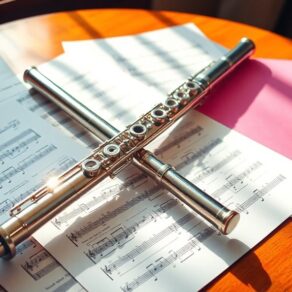If you're looking to enchant your audience, these nine classical flute solos are sure to impress. Start with Bach's "Partita in A Minor" for its intricate yet accessible melodies. Then explore Mozart's "Andante in C Major," which offers a lyrical experience. Vivaldi's "Concerto in D Major" showcases technical brilliance. Don't miss Beethoven's "Sonata in C Major" for a touch of drama. Other notable pieces include Debussy's "Syrinx," Tchaikovsky's "Meditation," and more. Each solo presents unique challenges that enhance your skills and captivate listeners. Stick around, and you'll uncover even more gems to enrich your flute repertoire!
Key Takeaways
- Explore renowned classical pieces by composers like Bach, Mozart, and Vivaldi for enchanting flute solos that captivate audiences.
- Select arrangements that offer high-quality transcription to ensure playability and reduce frustration during practice and performance.
- Consider including piano accompaniment to enhance the musical experience and emotional impact of solo performances.
- Choose pieces that align with your skill level to foster growth and confidence while avoiding frustration.
- Utilize collections with a variety of composers to enrich your repertoire and explore different musical styles and expressions.
31 Classical Flute Solos by History's Greatest Composers

If you're an advanced flutist seeking to expand your repertoire with pieces from history's greatest composers, "Classical Flute Solos" is an excellent choice for you. This collection features a diverse array of works by celebrated figures like Satie, Mozart, and Vivaldi, offering varying complexities that can challenge and inspire. While many pieces are accessible for intermediate players, some arrangements may pose difficulties due to poor transcription quality. You'll find that odd notations and awkward phrasing can complicate your practice. Despite these issues, many musicians appreciate the overall selection and value of the book. If you're willing to invest the time in adapting certain pieces, you'll discover a treasure trove of music that can truly enchant any audience.
Best For: Advanced flutists looking to enhance their repertoire with classical solos from renowned composers.
Pros:
- Wide variety of pieces from celebrated composers like Satie, Mozart, and Vivaldi.
- Challenges and inspires advanced players with differing complexities.
- Many musicians appreciate the overall selection and value of the book.
Cons:
- Some arrangements suffer from poor transcription quality, leading to awkward phrasing.
- Not suitable for beginners or moderately advanced players; more fitting for very advanced flutists.
- Quality of notation may resemble software outputs, making authentic performance difficult.
31 Classical Flute Solos Sheet Music
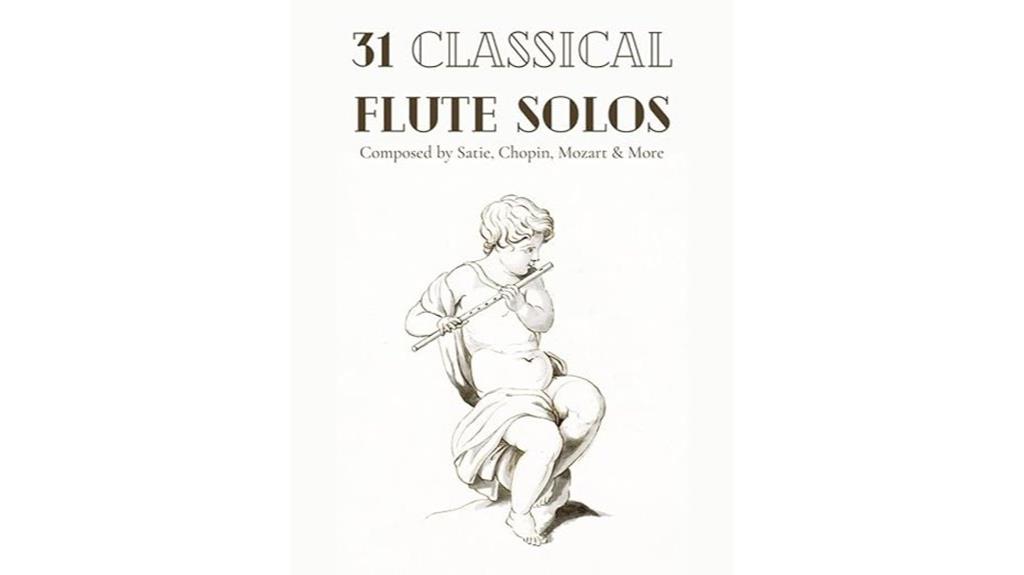
The "Classical Flute Solos" sheet music is perfect for intermediate to advanced flutists looking to expand their repertoire with iconic pieces from composers like Satie, Chopin, and Mozart. This collection offers a variety of well-known selections, each with different levels of complexity and keys. By mastering one piece, you'll find yourself better prepared for the next challenge.
However, it's essential to have complete, original scores to truly capture the intent of each composer. Incomplete scores can frustrate your practice and performance. You might struggle with reconstructing missing parts, which can hinder your progress. Aim for completeness in your music to achieve the best performance possible. This meticulous attention to detail will enhance your playing and delight your audience.
Best For: Intermediate to advanced flutists seeking to enhance their repertoire with iconic classical pieces.
Pros:
- Variety of Selections: Includes a diverse range of well-known compositions catering to different skill levels.
- Skill Development: Mastery of each piece prepares players for progressively challenging works.
- Completeness: Emphasis on original scores ensures faithful representation of composers' intentions.
Cons:
- Incomplete Scores: Some parts may be missing, complicating practice and performance.
- Reconstruction Challenges: Difficulty in reconstructing missing elements can hinder progress.
- Frustration Potential: Incomplete materials may lead to frustration during the learning process.
Concert And Contest Collections C Flute Solo Part
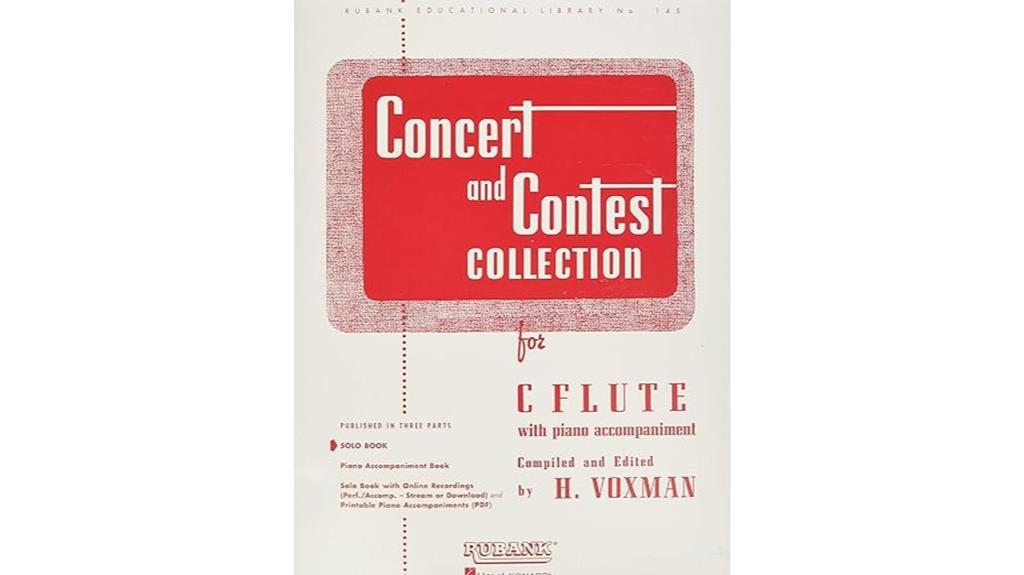
For intermediate players seeking to elevate their performance skills, the "Concert And Contest Collections C Flute Solo Part" offers a valuable resource. It's designed for both high school competitions and adult musicians, making it an enjoyable choice for a range of players. Many find it well-priced and appreciate the excellent concert pieces included. However, be careful—some buyers have reported confusion regarding the product description, particularly concerning the absence of piano accompaniment. To guarantee you get the right content, always check the specific package details before purchasing. While the collection garners positive reviews, clarifying what you expect will enhance your experience, allowing you to focus on mastering these enchanting solos.
Best For: Intermediate players, including high school students and adult musicians looking to enhance their performance skills with enjoyable concert pieces.
Pros:
- Well-suited for both high school competitions and adult players.
- Excellent selection of concert pieces at a great price.
- Quick delivery and received in good condition.
Cons:
- Misleading title regarding the absence of piano accompaniment.
- Confusion about the content received by some buyers.
- Difficulty in verifying the correct version before purchase.
Flute Classical Music Book: 46 Songs for Flute Solo
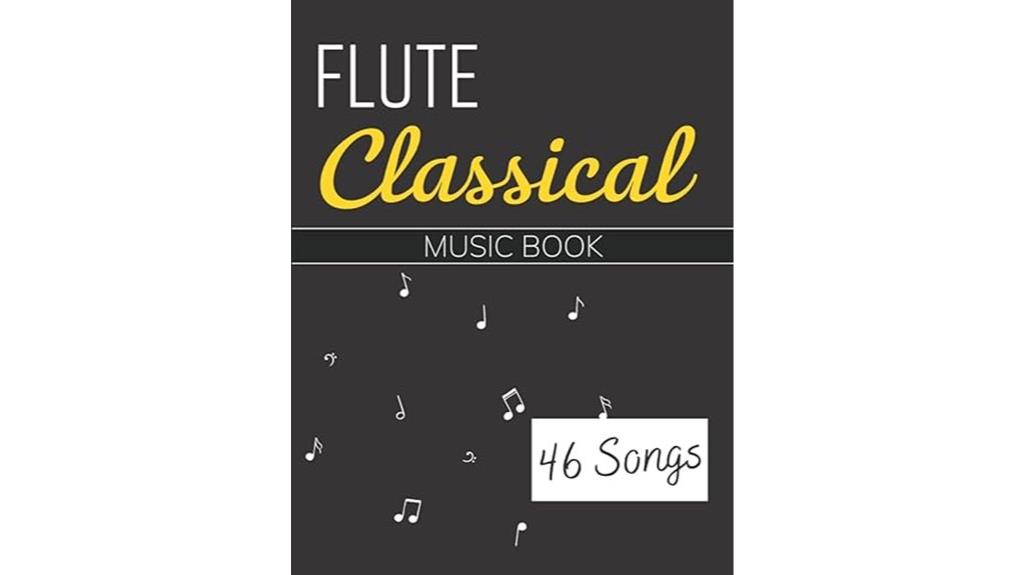
Designed with beginners in mind, the "Flute Classical Music Book: 46 Songs for Flute Solo" offers an accessible introduction to classical music. Featuring works by renowned composers like Bach, Satie, and Mozart, this collection aims to simplify the classics for new players. While some users appreciate its quality as a gift, others criticize the flute parts, describing them as crudely created and awkwardly laid out. Significantly, the absence of piano accompaniment may limit your performance options. If you're looking for a solid foundation in flute music, this book can be a starting point, but consider exploring other collections that offer more polished arrangements and better idiomatic expression for the flute.
Best For: Beginners seeking an accessible introduction to classical flute music.
Pros:
- Easy to understand: Simplified arrangements make it suitable for novice players.
- Variety of composers: Includes pieces from well-known classical composers, offering a diverse musical experience.
- Gift potential: Some users find it a thoughtful gift option for aspiring flutists.
Cons:
- Lacks piano accompaniment: The absence of piano parts may limit performance possibilities.
- Quality concerns: Flute parts are described as crudely created and not idiomatic for the instrument.
- Layout issues: Awkward line and page layouts, with minimal articulation indicated, hinder readability.
30 Classical Solos For The Flute: Sheet Music by Mozart, Beethoven, Bach & More
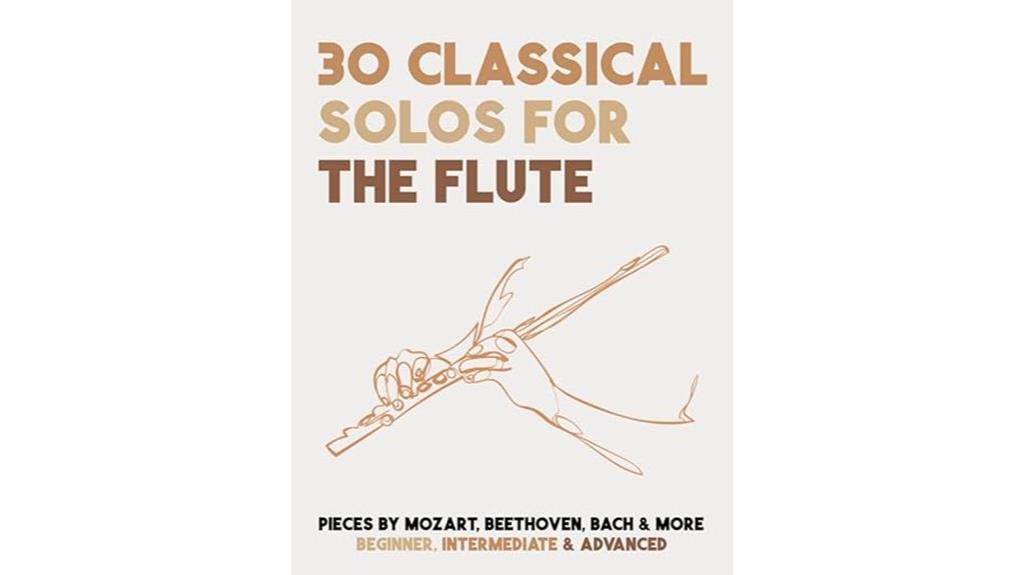
Looking to enhance your flute repertoire? "Classical Flute Solos" features a curated selection of pieces by iconic composers like Mozart, Beethoven, and Bach, making it an excellent choice for flutists with some experience. This collection includes about 30 works, with a mix of easier selections and more complex pieces, primarily in G and D major. While you might find several pieces manageable, some of the intermediate and advanced selections can be quite challenging, especially with added accidentals and intricate meters. If you're a beginner with just a year of practice, this collection might not be the best fit for you. Additionally, be aware that the layout of the music could use some improvement, particularly for longer pieces.
Best For: This collection is best for flutists with some experience who are looking to expand their repertoire with classical pieces.
Pros:
- Variety of Composers: Features works by iconic composers such as Mozart, Beethoven, and Bach.
- Range of Difficulty: Includes a mix of easier and more complex pieces, catering to different skill levels.
- Cultural Enrichment: Provides an opportunity to engage with classical music and improve performance techniques.
Cons:
- Not Suitable for Beginners: May be too challenging for flutists with only a year of practice.
- Layout Issues: The music layout could be improved, especially for multi-page pieces, leading to unnecessary blank pages.
- Complexity of Pieces: Some intermediate and advanced selections can be quite difficult due to added accidentals and intricate meters.
Easy Classical Flute Solos
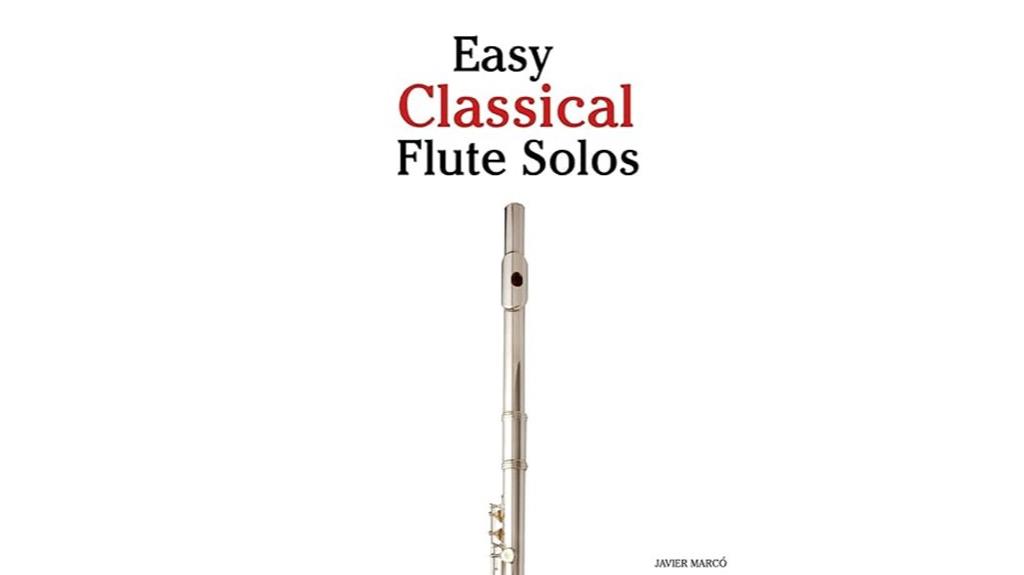
Easy Classical Flute Solos are perfect for beginners and those returning to the flute after a long break. These pieces feature familiar works by composers like Bach, Beethoven, and Handel, arranged simply to suit your skill level. You'll find many short excerpts, often consisting of just 2-3 notes, making sight-reading a breeze. While experienced players may find them too easy, they reignite the passion for music in many returning players, including those in their 40s. Some arrangements even sound better when played an octave higher. Though the presentation may lack polish, these solos are excellent for teaching young learners or sharing musical moments with family. You'll appreciate the joy these easy selections bring to your flute journey.
Best For: Beginners, first-year students, and those returning to the flute after a long break who seek familiar classical pieces to play.
Pros:
- Simplified arrangements of well-known classical compositions make sight-reading easy.
- Short excerpts are ideal for quick practice sessions and building confidence.
- Suitable for educational use, helping teach young learners and fostering family music experiences.
Cons:
- Experienced players may find the selections too simplistic and lacking challenge.
- Some users criticize the book's professional quality and layout.
- A few arrangements may come off as minimalistic, diminishing musical engagement.
Classic Festival Solos for C Flute, Vol 1
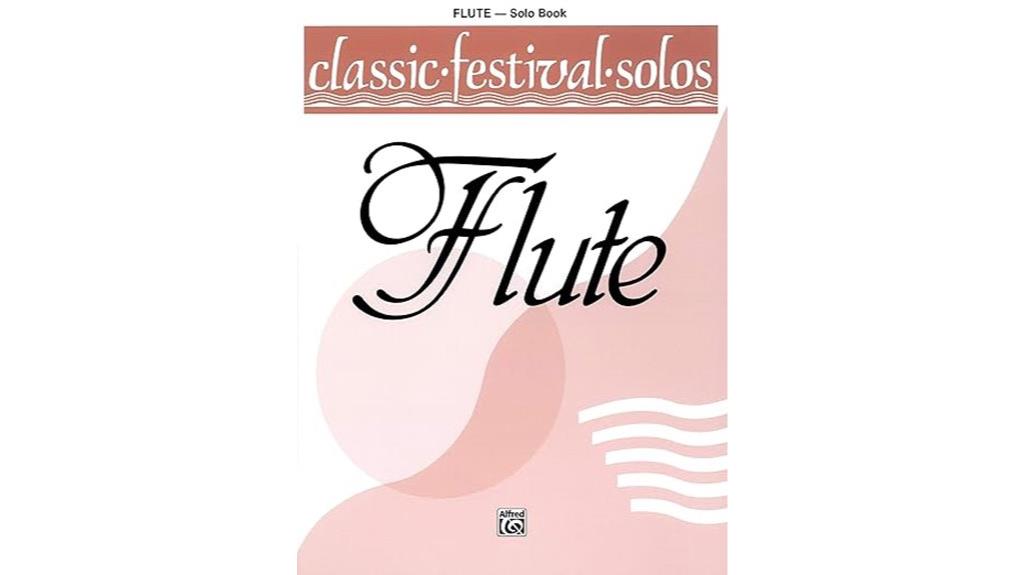
If you're a flutist seeking accessible yet engaging repertoire, "Classic Festival Solos for C Flute, Vol 1" is an excellent choice. This collection offers a fantastic variety of music, making it easy to find pieces that suit your style and skill level. The solos are on the easier side, perfect for those looking to build confidence and showcase their talents. However, keep in mind that both the solo and piano accompaniment parts are sold separately, so you may need to purchase the accompaniment book for a complete experience. While the delivery is prompt and the book is in good shape, some might find it disappointing that it doesn't include a CD of performances. Overall, this collection is a solid addition to your repertoire.
Best For: Flutists looking for a diverse selection of easy-to-read solos to enhance their repertoire.
Pros:
- Fantastic variety of music suitable for different styles and preferences.
- Solos are on the easier end, making them ideal for building confidence.
- Prompt delivery and good condition upon arrival.
Cons:
- Solo and piano parts are sold separately, which may require additional purchases.
- Lacks a CD of performances or accompaniment for practice.
- Some customers reported order issues, receiving incorrect items.
Classic Rock Instrumental Solos for Flute (Book & CD)
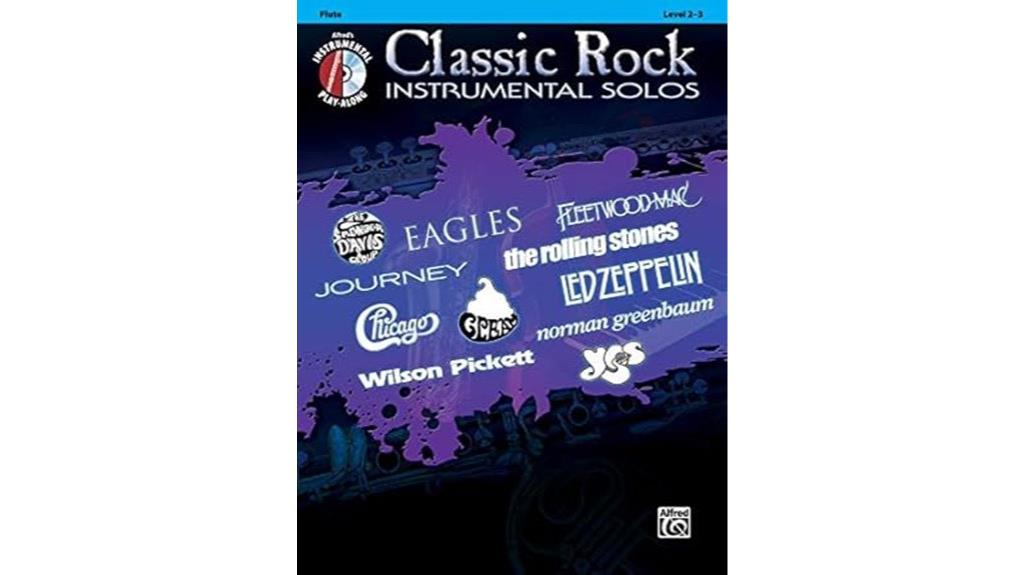
Classic Rock Instrumental Solos for Flute (Book & CD) is an ideal choice for intermediate flute players enthusiastic to explore popular music. This simple yet high-quality music book features a fantastic selection of classic rock favorites, making it perfect for your repertoire. You'll appreciate the excellent arrangements, which sound great when paired with the accompanying CD that mimics a full band.
However, some users have reported issues with the .cda files, so be prepared for that. While it's well-suited for performances in pediatric wards, some pieces may require tricky page turns without rests. Overall, this book has received positive feedback, with many players noting improvements in their skills and even purchasing multiple Alfred Books. Enjoy rocking out with this collection!
Best For: Intermediate flute players who enjoy classic rock music and want to improve their skills with well-arranged pieces.
Pros:
- Excellent selection of classic rock favorites with high-quality arrangements.
- Accompanying CD provides a full band sound, enhancing practice and performance.
- Positive user feedback indicates satisfaction and noticeable skill improvement.
Cons:
- Some users reported technical issues with .cda files on the CD.
- Certain pieces require challenging page turns without rests, which can be difficult for performers.
- A few users expressed a desire for more complex arrangements.
Rubank Book of Flute Solos – Intermediate Level with Online Audio
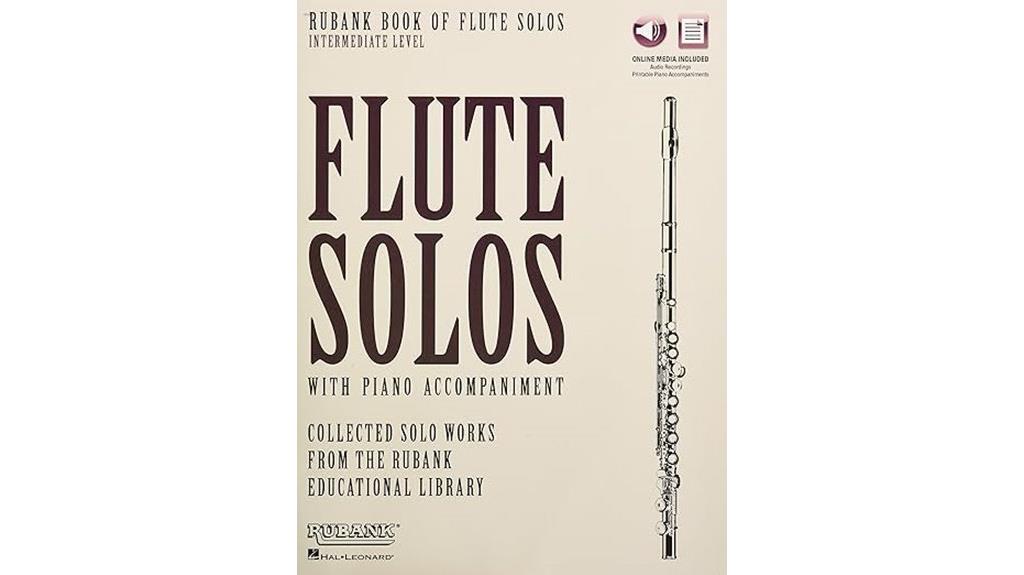
For flute players enthusiastic to bridge the gap between beginner and more advanced repertoire, the Rubank Book of Flute Solos – Intermediate Level is an excellent choice. This book focuses on the easier side of intermediate pieces, making it suitable even for some beginners. You'll find arrangements of famous classical works from various periods, alongside original compositions by Koepke, like the delightful "Chanson Pastorale" with piano accompaniment. This collection not only aids your progression to more challenging solos but also provides enjoyable practice opportunities that foster skill development. Users of all ages rave about the variety it offers, ensuring you'll find something that resonates. While there's no accompaniment book, the online audio makes your practice sessions more engaging and effective.
Best For: Flute players looking to transition from beginner to intermediate pieces with a variety of classical arrangements and original compositions.
Pros:
- Variety of solos: Offers a diverse selection of classical pieces and original works.
- Online audio: Provides engaging practice through streaming or downloadable audio.
- User-friendly: Suitable for both beginners and intermediate players, making it accessible to a wide range of skill levels.
Cons:
- No accompaniment book: Lacks a dedicated accompaniment book for additional support.
- Limited advanced material: Focuses on the easier side of intermediate level, which may not challenge more advanced players.
- Potential for repetition: Some users may find the selections repetitive if they seek a wider range of styles.
Factors to Consider When Choosing Classical Flute Solos

When choosing classical flute solos, think about your skill level and how well the piece matches your abilities. You'll also want to contemplate the variety of composers and the complexity of the pieces to keep your repertoire fresh and engaging. Finally, make sure the arrangements align with your performance goals for the best results.
Skill Level Appropriateness
Selecting the right classical flute solo can feel like maneuvering through a maze, especially with the wide range of skill levels represented in various collections. It's vital to reflect on your current skill level before diving into a piece. Some collections are tailored for beginners, featuring simplified arrangements and familiar melodies that help build your confidence. If you're just starting, these collections can guarantee a positive playing experience.
However, if you're at an intermediate level, be cautious. Many intermediate pieces still present challenges and may require excessive practice or adjustments for a practical performance. It's important to choose pieces that match your technical skills to avoid frustration.
Additionally, watch out for arrangements that might not be idiomatic for the flute. These can complicate the learning process, especially for less experienced players. Some collections may even lack completeness or have poorly notated scores, which can hinder your progress. Always prioritize collections that are well-suited to your abilities, allowing you to enjoy the music while continuing to develop your skills. Remember, the right piece can inspire and motivate you on your flute journey.
Variety of Composers
Exploring a variety of composers can greatly enrich your experience as a flutist. When you investigate works by composers like Bach, Mozart, Beethoven, and Chopin, you open the door to a rich repertoire that showcases different styles and periods in classical music. Each composer offers unique techniques and expressiveness, allowing you to discover the nuances inherent in their writing styles.
By incorporating pieces from various composers, you'll encounter distinct rhythmic patterns and melodic structures that enhance your versatility and adaptability in performance. This exposure not only broadens your musical understanding but also deepens your appreciation for the evolution of flute music over time.
Additionally, choosing solos from a range of composers helps you prepare for performances by allowing you to select pieces that resonate with your personal musical voice and strengths. Whether you're drawn to the lyrical melodies of Mozart or the intricate counterpoint of Bach, each composer provides a different lens through which to express your artistry. Embracing this variety will not only make your practice sessions more enjoyable but also captivate your audience with a dynamic and engaging performance.
Complexity of Pieces
Choosing a classical flute solo involves considering the complexity of the piece, which can greatly influence your performance experience. The complexity can vary considerably, from simple melodies that are perfect for beginners to intricate compositions designed for advanced players. As you explore your options, think about your current skill level and what techniques you're comfortable with.
Intermediate players often enjoy tackling pieces that challenge them without being overwhelming, while advanced flutists might seek out solos that push their technical boundaries. Pay attention to works by renowned composers, as these pieces frequently require mastery of breath control, articulation, and dynamics.
Additionally, some arrangements may introduce their own set of challenges, like odd notations or transcriptions that don't align well with flute playing. You should also consider the presence of multiple accidentals, complex meter changes, and a lack of key signatures, all of which can heighten the difficulty level. Ultimately, balancing your ambition with your current capabilities will help you choose a solo that not only showcases your talent but also allows you to grow as a flutist.
Arrangement Quality Considerations
When it comes to classical flute solos, the arrangement quality can heavily influence your performance experience. You should prioritize arrangements that enhance playability, as some transcriptions may present challenging or even impossible notes due to a lack of understanding of flute techniques. Pay attention to the notation; poorly notated scores often resemble raw software outputs rather than polished compositions, which can lead to frustration during practice and performance.
Incomplete scores can further complicate your experience, forcing you to improvise or struggle to achieve the intended musicality. While simplified arrangements might be appealing for beginners, be cautious—overly simplistic adaptations can strip away the depth and engagement of the music.
It's essential to evaluate both the complexity and idiomatic nature of the arrangements. Pieces that weren't originally composed for flute may not translate well to the instrument, resulting in awkward phrasing and technical challenges. By carefully considering these factors, you can select classical flute solos that not only suit your skill level but also captivate your audience with their beauty and expressiveness.
Performance Goals Alignment
Aligning your performance goals with the classical flute solos you select is essential for a fulfilling musical journey. Start by evaluating the skill level required for each piece. You want to guarantee your current proficiency matches the complexity, so you don't face frustration during practice or performance. If a piece is too complex, it can hinder your progress and dampen your enthusiasm.
Next, consider the original composition intent. Many transcriptions may lack completeness, which can affect your ability to play them as intended by the composer. Choose collections that offer a variety of pieces, allowing you to build skills progressively. Gradual mastery through increasingly challenging works will boost your confidence and guarantee you're well-prepared for performances.
Finally, prioritize collections with high-quality notation and clear layouts. Poor notation can hinder your ability to perform authentically and may force you to spend extra time relearning pieces. By considering these factors, you'll choose classical flute solos that not only align with your performance goals but also enhance your overall musical experience. Remember, every choice you make influences your journey as a flutist.
Accompaniment Availability
Accompaniment plays an essential role in enhancing the performance of classical flute solos. When choosing a piece, always check if the sheet music includes piano accompaniment. Some collections only provide the flute part, which can limit your performance options. Many solo books require you to purchase an accompaniment book separately, leading to extra costs and logistical challenges. The absence of piano parts can hinder the overall musical experience, as certain compositions are designed to be played with accompaniment to achieve their full emotional impact.
Additionally, confirm that the arrangement suits the performance setting you have in mind. Some solo collections might not offer the necessary accompaniment for public performances, potentially compromising your presentation. It's vital to verify the specific content of the music package before purchasing. Discrepancies can arise between the title and the actual materials included concerning accompaniment, which could set you back in your preparation.
Notation Clarity and Accuracy
How can the clarity and accuracy of notation affect your performance of classical flute solos? The quality of the sheet music you choose plays an essential role in how authentically you can perform. If you encounter poorly notated pieces, they might read like generic software outputs rather than well-edited scores, leaving you frustrated. Incomplete scores can hinder your ability to play the music as the composer intended, which is vital for delivering a mesmerizing performance.
Additionally, watch out for odd notations or unconventional phrasing. They can complicate your interpretation and may indicate a lack of understanding of flute-specific techniques. If a piece requires excessive practice due to unclear notation, it may not be practical for your performance goals.
Awkward line and page layouts can disrupt your reading flow, making it challenging to maintain focus during a performance. This disruption can impact your overall experience and the audience's enjoyment. As a result, always prioritize clarity and accuracy in the notation of the solos you choose, ensuring you're equipped to enchant your audience with every note.
Frequently Asked Questions
What Are the Benefits of Playing Classical Flute Solos?
Playing classical flute solos offers you numerous benefits. You'll improve your technical skills while developing your musical expression and interpretation. It helps build your confidence as you perform, allowing you to connect with audiences. You'll also enhance your breath control and tone quality, leading to a richer sound. Plus, immersing yourself in classical music deepens your appreciation for the genre, inspiring creativity and passion in your overall musicianship. Enjoy every note!
How Can I Improve My Performance of Classical Flute Pieces?
Isn't it exciting to think about how much you can improve your classical flute performances? To enhance your skills, practice consistently and focus on your breath control. Record yourself to identify areas for improvement, and don't shy away from seeking feedback from teachers or peers. Experiment with dynamics and phrasing to bring your pieces to life. Finally, embrace every performance opportunity; each one helps you grow as a musician.
Are There Specific Techniques for Interpreting Classical Flute Music?
When interpreting classical flute music, focus on dynamics and phrasing. You can experiment with different articulations to convey emotion. Listen to recordings of renowned flutists to understand stylistic choices. Don't be afraid to add your personal touch, but respect the composer's intentions. Practicing slow passages allows you to explore nuances. Finally, consider the historical context of the piece to enhance your interpretation and connect more deeply with the music.
What Are Some Common Mistakes to Avoid When Playing Solos?
When you step onto that stage, remember, it's not just about hitting the right notes; it's painting a musical landscape. A common mistake is rushing through phrases, which can make your performance feel disjointed. Ignoring dynamics can rob your piece of its emotional essence. Also, don't forget to connect with your audience; they're your canvas. Finally, always warm up properly—no one wants a masterpiece marred by a cracked note!
How Do I Select the Right Solo for My Skill Level?
To select the right solo for your skill level, assess your current abilities and comfort with different techniques. Start by choosing pieces that challenge you but aren't overwhelming. Look for solos that match your interests, as you'll be more motivated to practice them. Consider seeking advice from your teacher or peers; they can help recommend pieces that suit your skills. Remember, it's all about enjoying the process and growing as a musician!
Conclusion
In the world of classical music, choosing the right flute solo can feel like finding a needle in a haystack. Yet, with the enchanting melodies of history's greatest composers at your fingertips, you're bound to captivate any audience. Whether you're performing for an intimate gathering or a grand concert hall, these solos can transform your flute into a voice that resonates deeply. So, let your passion for music shine and watch as your audience is swept away by your artistry.





